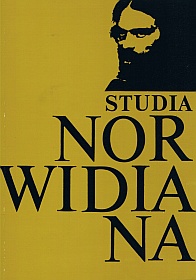Norwid in the Theatrum Mundi: Some Questions
Abstract
Norwid' plays, which have often been accused of being non-stageable, usually appear to literary historians to emerge from a void which they believe existed between the Romantic revolution of the stage and the beginnings of bourgeois theatre. And yet, the bulk of his dramatic work was written in a period which was very important for theatrical history. Sławomir Świontek quite rightly points out that in dealing with Norwid's drama we should first of all concentrate on the ten years from 1862 to 1872. Those years saw the creation of all four of Norwid's ‟full-size” dramatic pieces: Aktor (1862-1867), Za kulisami − Tyrtej (1865-1869), Pierścień Wielkiej-Damy (1872), Kleopatra i Cezar (1869-1872). Thus, the peak of Norwid's creativity as a playwright coincided with the flourishing and decline of the Second Empire. It is when they are seen against the background of the Second Empire's theatrical experiences and of its culture at large, tightly connected as it was with the aesthetics of the theatre, that the Polish writer's proposals turn out to be truly astounding. Therein lies the paradox of Norwid's modernity. His plays are so strikingly different from what was happening on the stage of imperial Paris that one must stop and reflect.
From the point of view of the contemporary aesthetics of the theatre, the proposals of the author of Tyrtej and Kleopatra i Cezar would have appeared destructive of the prevailing form, indeed of theatre as such. One could use the famed formula of F. Sarcey, the Second Empire's main codifier of the piece bien faite, c'est n'est pas du théâtre, to comment on Norwid's proposals. The ideal of theatrical quality to which Norwid wanted to be faithful preserved the memory of the kathartic functions of theatre and drama. In this, Norwid was probably closer to the Romantic tradition than to his own epoch, for which the scene a faire was the most important. There is no such scene in his plays, and any allusions to it are devoid of the scene a faire sense. It looks as if he wanted to oppose his comedies, which have no dramatic conflict and no culmination point, to the triumph of the piece bien faite. Was he trying to replace the mystery revealed to the audience in the truth of the theatrical effect with the truth of silence?
Copyright (c) 1997-1998 Studia Norwidiana

This work is licensed under a Creative Commons Attribution-NonCommercial-NoDerivatives 4.0 International License.





